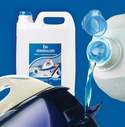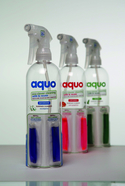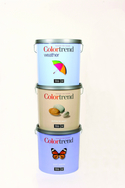The plasticity of demand
18 January 2011For products designed to take the strain out of tackling household chores, rigid and flexible plastics packaging stand out as the formats of choice, reports Sam Cole.
Although there may be no substitute for applying a bit of elbow grease when it comes to carrying out those necessary cleaning and maintenance jobs around the house, garden or in the tool shed, new pack formats are at least helping to make them a lot less arduous.
Easy to handle, convenient, and pretty much impervious to breakages – and in direct consequence unnecessary and avoidable accidents - rigid and flexible packaging solutions now increasingly hold sway within an environment where function largely dictates form.
“We plan to eliminate the total use of any glass in the kitchen and bathroom,” says US based flexible packaging equipment supplier PPi Global Technologies’ CEO Charles Murray in unequivocally pressing the claims of stand-up pouches (SUPs) as the preferred option for most household commodity items. It’s an aspiration that has equal resonance to flexible and rigid plastics packaging manufacturers alike, and one that brands - on the grounds of both cost and on-shelf differentiation - and retailers, in the furtherance of streamlining in-store operations, are showing every intention of realising.
Reducing the carbon footprint incurred in material handling logistics and transit is a further key driver towards accelerating adoption. Asda has recently ticked pretty much all of these boxes – as well as tapping into some timely latent age of austerity sustainability – in spearheading a WRAP initiative aimed at trialling the potential of refillable pouches for its own-label fabric conditioner.
Whether this means good news for the packaging industry – for whom in this instance, less quite patently means just that by an estimated 96% – remains to be seen. Currently, the trial is running in just five stores, but if deemed sufficiently successful could extend to a further 15 with the option of a total roll-out across all UK outlets.
Concentrated fabric conditioner is bulk transported and held ‘back of store’, then piped to the aisle to state-of-the-art automated machines. Consumers can then purchase the product in reusable pouches that can be refilled up to 10 times, with RFID enabled labelling applied to the PET/PA/LLDPE constructed pouch ensuring that re-usage doesn’t exceed that limit. As a further incentive, the purchase price reduces for each successive refill.
Extending the use of the original packaging can also be done at home. The 750ml blow-moulded PET bottle developed by RPC Llantrisant for Kilrock’s aquo range of surface cleaners incorporates a trigger spray that can be refilled and reused up to 20 times due to a soluble capsule tha releases its cleaning power once dissolved in water.
Branded as ‘eco-clever cleaning,’ Kilrock estimates that the refillable trigger-head bottle (that incorporates 30% rPET) also cuts down on production and packaging waste by 20 times, while the lighter, unfilled bottle reduces the carbon footprint accumulated during transit.
Concentrated effort
In addition to usage for outer pack construction, polymer technology is indispensible to facilitating a more accurate delivery of cleaning products, especially soaps and detergents.
According to PDD Group FMCG Principal Alex Peacop, the switch to gels and concentrates – which can only be effectively packaged in plastics - was led by WalMart in the USA as an environmental strategy to reduce carbon footprint, with brands rapidly appreciating the cost and transit savings that would accrue as a result of no longer shipping unnecessary water; sometimes as much as 95% of product content.
“Time was that beneath most household sinks were massive containers of cleaning products being used irregularly,” he says. “Consider the pressure on storage, the possibility of leakage – and the likelihood was of there being a real mess underneath the U-bend. But if you’re just storing a delivery container and smaller concentrates that you mix with water as and when you need them, it’s clearly so much better.”
The argument for brands is self-evident: less transport cost; less weight; less storage space on the shelf – and, of course, a more efficient mechanism.
Whilst the Ariel gel Excel PP containers operate on the squeeze principle incorporating a flip-top closure and visual guide to monitor content level, the US Method brand has an integrated spray pump that will deliver a single measure of concentrate in order to override over-dosing. Method uses 95% natural ingredients (claimed to be a quarter of the equivalent amount used by other concentrates), and as an added eco-bonus comes in a pack made of 50% recyclate material.
“You could call Method the ‘Innocent’ of laundry care,’” comments Studio Davis CEO Will Davis, whose design consultancy originated the Ariel Excel pack.”
Making lighter work of DIY
With the advantages of easier, safer handling and portability, rigid plastics containers are steadily squeezing metal and glass packaging out of the DIY store. Even so, there is still scope for further light weighting. In line with one of the major requirements of the Courtauld Commitment to reduce overall packaging weight, RPC Containers UKSC (UK Stock Containers) has trimmed 10% off its new Compact Eco-Lite 5 litre jerrycan and claims it is around 23g lighter than other similar container types.
With combination UN approval for use with a wide range of products including hazardous goods, the Compact Eco-Lite incorporates a wadless closures making it a fully recyclable mono material solution; a significant development for a standard HDPE container, says General Sales Manager David Baker.
“We are very mindful of the need to reduce packaging weight in line with the demands of today’s markets, but at the same time it is equally crucial that the resulting pack is robust and fit for purpose. This is vital for a jerrycan, which can have such a huge variety of uses,’ he says.
Astra Plastique is also targeting jerrycan applications ranging from 1 – 10 litre capacity with a new standard 42mm double tamper evident directionally adjustable and lockable pourer closure with an efficient anti-glug system.
The Jereboam two-part closure system comprises a PP screw-on base with tamper-evident band to the neck of the container, and hinged flip-top pourer in a wide range of opaque or translucent colours with a tamper evident tear-off strip for product security. Suitable for automotive, garden and household products, the pouring spout can be rotated to allow the container to be used in the most convenient position. The integrated flow regulator and splash-guard device prevents glugging and splashing to achieve clean, easy pouring.
RPC UKSC blow-moulding technology has enabled Westland Horticulture’s new trigger spray for weed control to come to market in a custom-designed container. The handheld sprayer attaches to 3 and 5 litre HDPE packs to combine the convenience of trigger sprayer operation with a large-size pack for maximum coverage – and for which, hitherto, storage of the sprayer attachment has always presented a challenge; either incorporated within an open holster integrally moulded at the rear of the pack or hung round the container neck.
Paint it plastics
Arguably, the most evident packaging format switch to rigid plastics in the DIY sector has been 100% PP paint cans, of which RPC Oakham is the UK’s leading supplier. ‘‘We’ve seen a high migration particularly from tinplate over the past two years. A lot of brands are switching formats; partly due to cost factors, but also because of the performance gains derived from a PP solution, which doesn’t rust and has better overall aesthetic values.”says General Sales Manager Mark Seddon.
“PP is very durable, has good impact-resistant properties and can withstand a wide range of ambient temperatures. Another important major gain is in respect of transit and logistics. With a 2.5 litre PP container weighing 10% less than its steel counterpart, a correspondingly lighter payload on the road results in significantly reduced CO2 emissions.
‘The biggest driver, however, is price – particularly on the larger packs of 10 litres and above, for which you’d be unlikely to see contained in anything other than plastics. It’s only when down below 5 litre sizes that tinplate comes into play.”
From a consumer perspective, the most obvious advantage that PP has over steel is that as it is opaque, the colour of the paint can be clearly seen at a glance. Continuing improvement in clarity is now achieving a virtual crystal-clear transparent wall. The steadily increasing adoption of in-mould labelling (IML), which can cover the total surface area, unlike direct print with limitations on upward and lower dimension, is a further option for projecting on-shelf brand identity.
Whilst the UK market has been an enthusiastic adopter of PP, the switch from steel has been less pronounced in other European markets. France, for example, is predominantly a tinplate market; likewise, Scandinavia. However, with most of the leading brands operating on a global basis, extended format rationalisation looks increasingly likely.
The 750ml blow-moulded PET bottle developed by RPC Llantrisant for Kilrock’s aquo range of surface cleaners incorporates a trigger spray that can be refilled and reused up to 20 times due to a soluble capsule that releases its cleaning power once dissolRPC The Ariel gel Excel PP container operates on the squeeze principle incorporating a flip-top closure and visual guide to monitor content level. Ariel The US Method brand has an integrated spray pump that will deliver a single measure of concentrate in order to override over-dosing. US Method One of the most evident packaging format switches to rigid plastics in the DIY sector has been 100% PP paint cans, of which RPC Oakham is the UK’s leading supplier. DIY Astra Plastique is targeting jerrycan applications ranging from 1 – 10 litre capacity with a new standard 42mm double tamper-evident directionally adjustable and lockable pourer closure with an efficient anti-glug system. Astra






